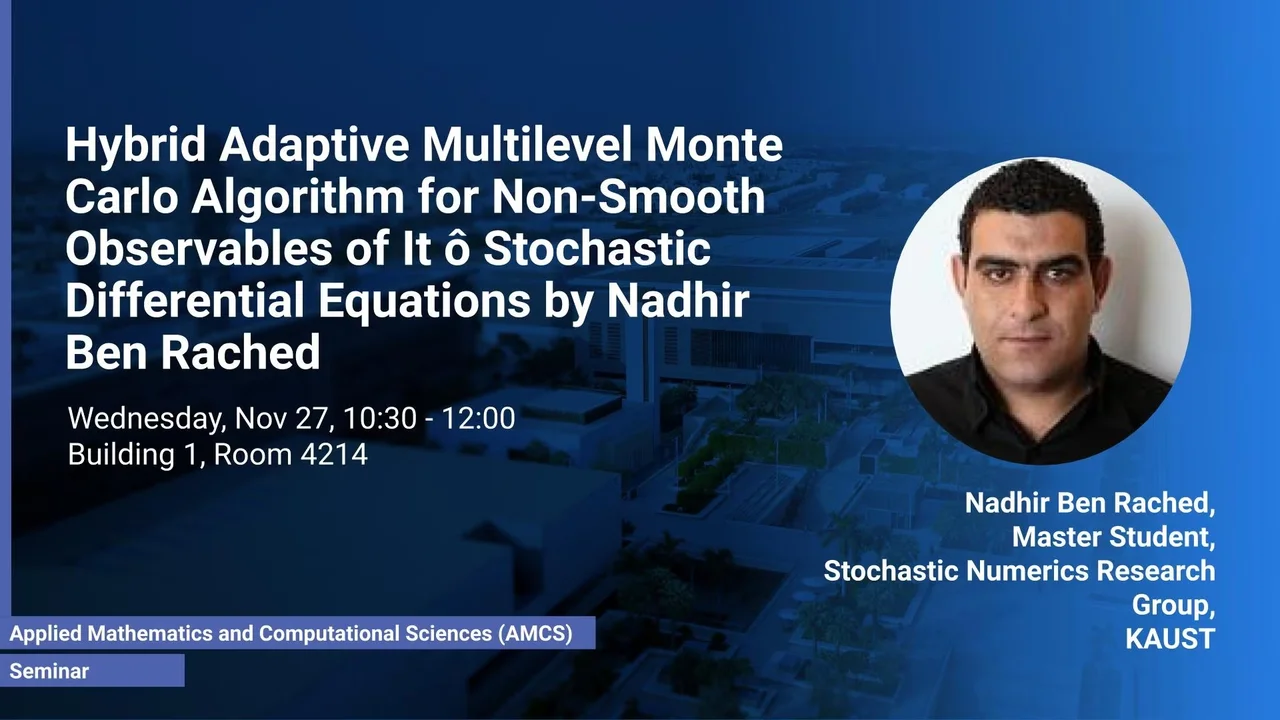
Hybrid Adaptive Multilevel Monte Carlo Algorithm for Non-Smooth Observables of It ô Stochastic Differential Equations by Nadhir Ben Rached
The Monte Carlo forward Euler method with uniform time stepping is the standard technique to compute an approximation of the expected payoff of a solution of an Itô SDE. For a given accuracy requirement TOL, the complexity of this technique for well-behaved problems, that is the amount of computational work to solve the problem, is O(TOL-3).
Overview
Abstract
The Monte Carlo forward Euler method with uniform time stepping is the standard technique to compute an approximation of the expected payoff of a solution of an Itô SDE. For a given accuracy requirement TOL, the complexity of this technique for well-behaved problems, that is the amount of computational work to solve the problem, is O(TOL-3).
A new hybrid adaptive Monte Carlo forward Euler algorithm for SDEs with non-smooth coefficients and low regular observables is developed in this thesis. This adaptive method is based on the derivation of a new error expansion with computable leading-order terms. The basic idea of the new expansion is the use of a mixture of prior information to determine the weight functions and posterior information to compute the local error. In a number of numerical examples, the superior efficiency of the hybrid adaptive algorithm over the standard uniform time-stepping technique is verified. When a non-smooth binary payoff with either GBM or drift singularity type of SDEs is considered, the new adaptive method achieves the same complexity as the uniform discretization with smooth problems. Moreover, the newly developed algorithm is extended to the MLMC forward Euler setting which reduces the complexity from O(TOL-3) to O(TOL-2(log(TOL))2). For the binary options case with the same type of Itô SDEs, the hybrid adaptive MLMC forward Euler recovers the standard multilevel computational cost O(TOL-2(log(TOL))2). When considering a higher-order Milstein scheme, a similar complexity result was obtained by Giles using the uniform time-stepping for one-dimensional SDEs. The difficulty to extend Giles' Milstein MLMC method to the multidimensional case is an argument for the flexibility of our new constructed adaptive MLMC forward Euler method which can be easily adapted to this setting. Similarly, the expected complexity O(TOL-2(log(TOL))2) is reached for the multidimensional case and verified numerically.
Brief Biography
Nadhir Ben Rached received the Diplome d’Ingénieur degree in Economics and Scientific Management from Ecole Polytechnique de Tunisie (EPT), La Marsa, Tunisia, in 2012. Currently, he is a Master's student in Applied Mathematics and Computational Science, King Abdullah University of Science and Technology (KAUST). He is a member of the Stochastic Numerics research group working under the supervision of Professor Raul Tempone. His current research interests include numerical analysis of stochastic differential equations, Monte Carlo simulations, and computational finance.
